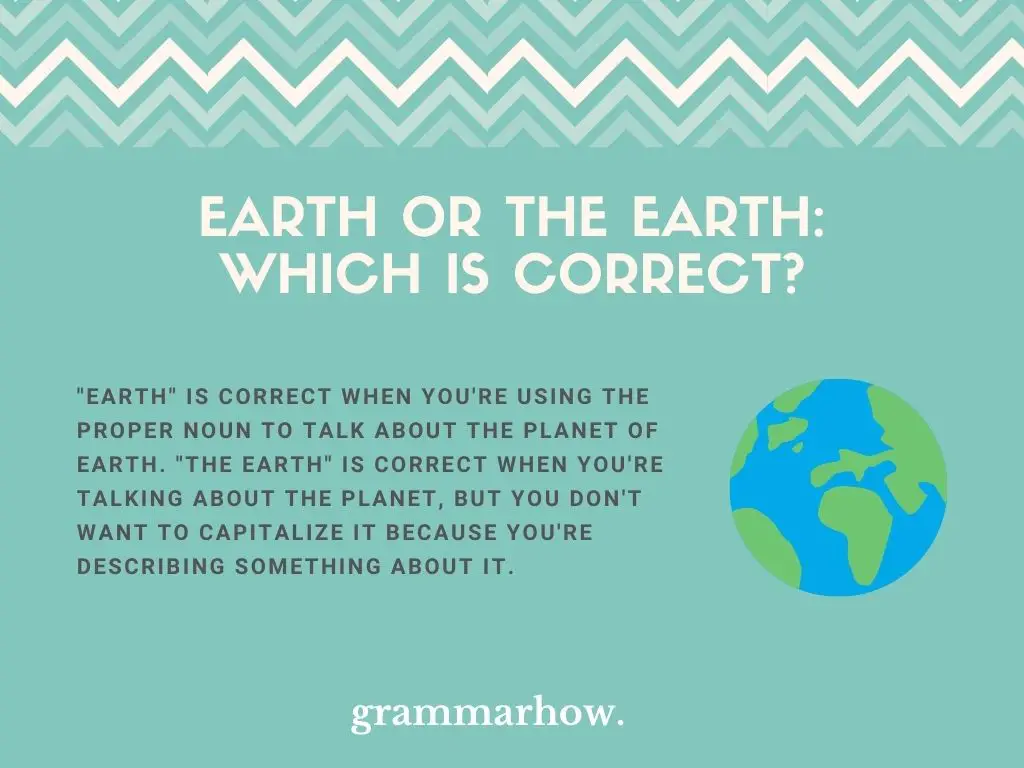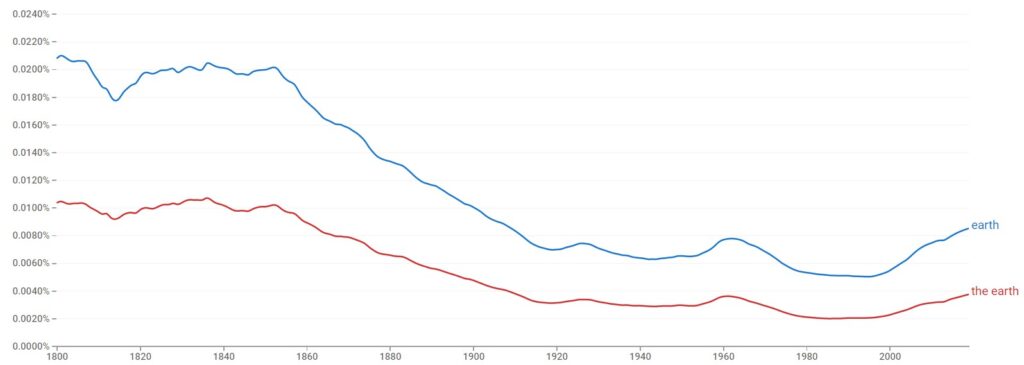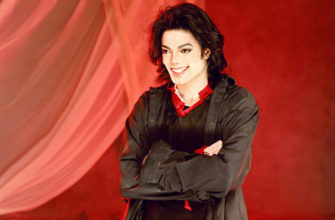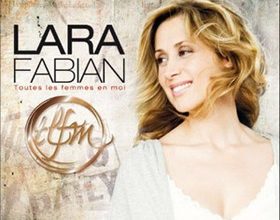Please enlighten me on this.
Thanks a million in anticipation.
For the second sentence, I think it should be: from arth
I’m reasonably confident you won’t get any consensus on this one either, EMP
Oh, thank you very much, Ewie. I was quite flexible for «from Earth» but I much preferred «the planet Earth» even after having heard «on P/planet Earth» many times. But you got me thinking, man. Thanks.
Thanks, Lun.
From the 14th Edition of The Chicago Manual, 7.115:
The names earth, sun, and moon are often lowercased, but when used as the names of specific bodies in the solar system they are properly capitalized, as are the names Mercury, Venus, Mars, and the rest. When Earth is used in this way, it is not preceded by an article. Sun and Moon, however, even when capitalized are preceded by the definite article.
From their extraordinary vantage point, the two astronauts looked back in awe at Earth (but the earth).
The precious atmosphere of Earth!
On that day, Earth passed between the Sun and the Moon.
As for adding the word «planet,» I think you can use either «Planet Earth» or «planet Earth» – whichever has more visual appeal for you. But in either case, no definite article, i.e. «on Planet Earth» or «on planet Earth.»
There’s no reason for «planet» to’ve been capitalized in that sentence.
Why can’t it be «attack on the planet Earth»? OLD.com mentions «the planet Earth» as an example, rendering it not entirely grammatically amiss — not least when it stands by itself.
Could someone provide further insight into this?
In my inexpert opinion, both «attack on planet Earth» and «attack on Earth» work.
There’s no ‘grammar’ about it, Korisnik: it’s entirely a matter of personal preference, style, usage, convention ~ in short, the usual English muddle
I just wonder why did the learned journalist drops the article before the word ‘earth’. Is it wrong to say on the earth in this context?
«On the earth» is «in (our) world». «On the earth» would be used when you oppose the (planet) earth to other planets, or make a distinction between them.
1. Mr Gates is the richest man on the earth.
2. Mr Gates is the richest man on earth.
Which is the correct sentence?
This is the fifth year in a row that Bangladesh has topped the corruption perception index.
I’d say n° 2. N°1 might suggest there are richer people living on Mars.
Well, you can «become aware» of it. Corruption is underground, so you can’t be aware of all the perception that is going on.
«on Earth» is definitely the correct usage. It is an expression that means «in the whole world». «on the earth» is not an expression so thus it takes a literal meaning, that is, on the ground as opposed to in the air or underwater (or on Mars). Note that I capitalized Earth because we are talking about the planet, not the dirt. I think it was a mistake of the author not to capitalize it.
For your second question, people can indeed «perceive» corruption. When people believe their country is corrupt, this will spread by word of mouth until everyone believes it whether or not they have had personal first-hand experience with corruption. Perhaps they have a friend who told them a story about someone who had to bribe a police officer to get out of a ticket. This is perceived corruption. It may or may not actually exist (but it probably does).
That’s not really correct. «The richest man on Earth» might also suggest that there are richer people living on Mars. But since there aren’t other people living on Mars yet, it is equivalent to «The richest man in the universe». When we have people living on other planets we will need to revise this expression.
Thank you, Markus, I’ll keep this in mind.
Oros: This question should really have been asked in a separate thread. But I am hoping that the on earth v on the earth question has been answered, so I’ll pick up on this one.
The purpose of the Transparency International index, as I understand it, is to present information about how the different countries are perceived — how they are seen from the outside.
So it is not the corruption that is perceived or measured in the index, it is the extent to which the country is perceived to be corrupt that is measured.
I thank everybody for the reples.
Now it is clear about the perception of corruption. It take place under the table. When it surfaces, you perceive it.
It should be the richest man in the world.
The words ‘on the Earth’ tantamount, on the ground, in the air, etc.
Should it be same with the other planets?
There are no human beings living on Sun.
There are no human beings living on the Sun. This is wrong.
Please correct me if I am wrong.
Some other idea crossed my mind too. We skip the article when it comes to proper nouns. We don’t say the Germany is a wealthy nation. It is Germany is a wealthy nation.
The God helped me. This is not correct.
God helped me. This is correct.
By the same token, it shoud always be Earth not the Earth.
I am really sorry to disappoint you.
It isn’t as easy as that
Some other idea crossed my mind too. We skip the article when it comes to proper nouns. Often, but not always.
You may find THIS POST with links about articles useful.
I am really sorry to disappoint you.
It isn’t as easy as that
Yes, of course this is a tall order for me.
Hi,
In the phrase:
which one is correct?
cheers
I would say «Earth,» as it is a proper noun and doe not require an article. Notice on Mars you did not say «the» on either sentence?
It would be really helpful if you justify your answer with a reliable reference, but thanks anyway.
that is just what I would say. I do not know all the rules and laws of the English language, I just speak it
have you read the forum´s rules???????
I personally wouldn’t say «the Earth» — I would say «the globe»/»the world», but not «the Earth».
I think that both ‘Earth’ and ‘the Earth’ are used regularly, but maybe in conjunction with Mars, which has no article, it is more elegant to omit ‘the’.
thanks so much for your kind replies.
cheers
Hi, do you put the definite article before «Earth»?
Generally, I would say yes, but there are expressions like ‘What on Earth are you doing?’ which do not take the article. Scientifically I am sure the article would always be used.
In China. So I guess it’s a print mistake.
To me the sentence seems perfectly normal. I teach science, and when we talk about Earth as a planet, there isn’t necessisarily the preceding the word.
Venus is about the same size as Earth.
Earth’s geography is fascinating!
When the astronauts were on the Moon, Earth appeared as a large orb setting before their eyes!
Hi mjscott, as far as I know, we usually have «the» before moon, sun? Do you suggest that you don’t have «the» before planets like Venus, Earth and so on?
Thanks Porteno, yous explanation helps a lot
I believe that Earth (without «the») is fairly common in the case where you are treating it as a proper name for the planet.
«Earth is 90,000,000 miles from the sun», for example.
It’s also used poetically in this way:
«Earth and all stars, loud-rushing planets,
Sing to the Lord a new song!»
To me, «Earth» without the article is used where you could use a first name, like Terra. If the sentence doesn’t work well with a proper name in it, adding «the» is probably a good idea.
The requirment of a definite article in «the moon» is because there are other moons in the solar system (like those of Jupiter).
When do you capitalize the name of our home planet?
I suppose-always, when we’re talking of Earth as a planet, not of earth in the garden.
From The Associated Press Stylebook (used by nearly all American newspapers and journalism schools):
«Generally lowercase (see thread on lowercase); capitalize when used as the proper name of the planet.»
#NASA has successfully transmitted data between the moon and Earth, using laser beams sent from this device. The transmission set new communication records with download rates of 622 megabits per second.
In this status they wrote the moon but they didn’t write the with Earth,
also, first letter of moon is small.
Is this the correct way to write ?
- Для чего нужны артикли в английском
- Неопределённый артикль (The Indefinite Article)
- Формы неопределённого артикля
- Предостережения
- Определённый артикль (The Definite Article)
- Произношение артикля the
- Нулевой артикль (Zero Article)
- Материалы по теме
- What is the difference between ?Feel free to just provide example sentences.
- Nothing really, just remember Earth always needs a capital letter.
- Unless the word earth is at the beginning of a sentence or in a title you dont capitalize it. Thier is no difference between the 2 above, and earth is the only planet in the solar system, that you dont capitalize the first letter
- Earth should be capitalized shouldn’t it? It’s a proper noun ?
- To be honest, I am ready to leave earth now lol jk
- Earth = planetthe earth = world
- The Earth refers to the planet we live on. «earth» refers to the ground or dirt, like soil
- This is wrong lol you didn’t define the two differently
- Srk
- Earth Or The Earth
- What Does “Earth” Mean?
- Common Noun
- Is “Earth” Or “The Earth” Used The Most?
- Should I Capitalize “Earth”?
- Examples Of How To Use “Earth” In A Sentence
- Examples Of How To Use “The Earth” In A Sentence
- Have You Mastered The “Earth” Or “The Earth” Grammar?
- Quiz Answers
Post mod (English Only / Latin)
I have moved this most recent question with earlier discussion.
As Effected points out, the previous discussion contains conflicting views.
Please read the earlier discussion before adding your contribution.
I don’t know that it’s incorrect to write that way, but it sure is inconsistent. I notice Wikipedia capitalizes ‘the Moon’.
In your sentence, I would prefer «the Moon and Earth» to «the Moon and the Earth.» I find the former more to the point.
Shall we use «on Earth» as #5 suggests?
I think it is hard to define whether it is general or not. For instance: He is the richest person on Earth. It can be interpreted in different ways. One could be labeled so called general usage. In the other case we could also emphasize he is the richest on Earth, not on the moon or etc. I am confused here.
When should I capitalise «earth» and when to use article «the» before «earth»?
Merriam-Webster on-line dictionary says it is often capitalized.
It would not be required to be capitalized, however.
Sreekanthyskn, as you can tell from this thread alone, we’ve had a number of discussions on this topic, so I’ve merged your question with one of the existing threads. I hope this thread, or Packard’s reply, answers your question, but if not, you’re welcome to ask them in this thread.
JustKate
English Only moderator
I wouldn’t capitalize it in a sentence like: «I wouldn’t marry you if you were the last man on earth.» To me that’s a conceptual use, meaning «the world». I would capitalize it in a sentence where it was referring to the physical planet: «It takes several minutes for a radio signal to travel from Earth to Mars.»
Thanks for all your kind replies.
«Пойми то, не знаю что», — эта фраза как нельзя лучше описывает недоумение русскоговорящего человека, когда он сталкивается с артиклями в английском языке. Нам трудно понять, для чего нужны артикли и когда какой ставить, так как в русской грамматике они просто отсутствуют. Вместе с героями «Звёздных войн» подробно разбираем, какие существуют типы артиклей и в каких случаях их необходимо употреблять. В конце статьи найдёшь промокод со скидкой на наш интенсив по продвинутой грамматике и лексике. Да пребудет с нами Сила.
Для чего нужны артикли в английском
Секрет довольно прост: основная функция артикля во всех языках мира — выражать категорию определённости (the) или неопределённости (a/an) существительного. В русском языке всё это выражается лексически. Для выражения определённости используются указательные местоимения: «этот», «эта», «это», «эти» или «тот», «та», «те», «то». По своей функции они соответствуют определённому артиклю. Для выражения неопределённости используются местоимения: «какой-то», «какая-то», «какие-то», «какое-то», а ещё числительное «один».
Вторая важная функция — показывать, что следом за артиклем идёт существительное. В английском одна и та же форма слова может быть как существительным, так и глаголом, и даже прилагательным. Как в таком случае отличить dress (платье) от to dress (одеваться)? Правильно, с помощью артикля. Он сигнализирует нам, что дальше будет именно существительное.
Каждый раз, когда ты не употребляешь артикль, носителю языка кажется, что ты вообще говоришь без существительных. Чтобы не звучать крипово, с артиклями всё же придётся разобраться. В английском языке различают три типа артикля: неопределённый a/an, определённый the и нулевой (zero) в случае, когда с существительным артикль не используется. Ниже обо всём по порядку.
Неопределённый артикль (The Indefinite Article)
1. Первое и ключевое правило, юный падаван, которое тебе нужно запомнить: неопределённый артикль используется только с существительными в единственном числе.
“My ally is the Force, and a powerful ally it is.” — Yoda
Мой союзник — Сила, и могущественный союзник это. Существительное ally в этом случае употребляется в единственном числе.
Дело в том, что своим происхождением неопределённый артикль обязан английскому числительному one (один). Поэтому как только ты видишь существительное во множественном числе, знай — перед ним нельзя поставить неопределённый артикль. Хотя это не значит, что слово one и артикль a/an взаимозаменяемы.
Например, если тебе нужен один световой меч на чёрном рынке, так и говори: I need one lightsaber. Если тебе нужен просто какой-то световой меч, ты можешь сказать: I need a lightsaber. Улавливаешь разницу? Скорее всего, ты так и так выберешь один меч, но смысл предложений всё равно отличается. А вот если ты давно охотишься за конкретным световым мечом, тогда будешь использовать определённый артикль the, но об этом позже.
2. Второе правило, которое значительно облегчит тебе выбор: неопределённый артикль a/an мы ставим, когда речь идёт о чём-то общем. То есть мы говорим не о конкретном человеке, предмете или явлении, а об одном из многих. На то он и неопределённый артикль, что никакой конкретики.
“That’s no moon. It’s a space station.” — Obi-Wan Kenobi
Это не луна. Это космическая станция. Какая-то космическая станция, одна из многих.
Обрати внимание, что если вместе с существительным ты хочешь использовать прилагательное, артикль ставится перед прилагательным.
“If there’s a bright center to the universe, you’re on the planet that it’s farthest from.” — Luke Skywalker
Если у Вселенной есть сияющий центр, то ты — на планете, которая находится от него дальше всех. Прилагательное bright стоит между артиклем и существительным.
3. С происхождением неопределённого артикля связано ещё одно правило его употребления. Артикль a/an мы употребляем для указания единичности при выражении мер времени, расстояния, веса, количества, периодичности.
Corellian wine costs five credits a litre in the bars of Tatooine.
Кореллианское вино стоит 5 кредитов за литр (один литр) в барах Татуина.
Ту же единичность неопределённого артикля можно найти в устойчивых словосочетаниях, которые передают однократность действия:
- To have a rest — отдохнуть;
- To have a snack — перекусить;
- To make a mistake — ошибиться;
- To give a lift — подвезти;
- To play a trick — подшутить;
- As a result of — в результате.
4. Четвёртое правило гласит: используй артикль a/an, когда существительное является обобщающим понятием для всей группы предметов, лиц, явлений. То есть когда мы кого-то или что-то классифицируем — указываем, к какой группе, типу, роду этот кто-то или что-то относится.
“I am a Jedi, like my father before me.” — Luke Skywalker
Я джедай, как и мой отец. Тут Люк подчёркивает свою принадлежность к группе адептов светлой стороны Силы, он один из представителей этой группы.
Неопределённый артикль в этом значении часто встречается в английских пословицах и поговорках, где говорится о свойствах, характерных для любого предмета или лица из этого класса.
A bad workman always blames his tools. — дословно: плохой рабочий всегда винит свои инструменты. А русский эквивалент пословицы: плохому танцору всегда ботинки мешают.
5. Артикль a/an мы используем, когда впервые говорим о каком-то явлении, предмете или лице. Если мы продолжаем говорить об этом явлении, предмете или лице дальше, то уже независимо от количества упоминаний будем использовать определённый артикль the.
We spotted a spaceship at a distance of 100 megalights. The spaceship looks like a T-65 «X-wing» starfighter.
Мы засекли космический корабль на расстоянии 100 мегасвет. Корабль похож на звёздный истребитель T-65 «X-wing».
6. И последнее. Используй неопределённый артикль, когда говоришь о повторяемости действий за одну единицу времени: раз в неделю, два раза в месяц, пять раз в год. Но не забывай второе правило: если используешь множественное число при указании единицы времени (один раз каждые две недели), артикль a/an не нужен.
Chewie checked the readings three times a day.
Чуи проверял показания приборов три раза в день.
Luke asked Master Yoda for advice once every two weeks.
Раз в две недели Люк спрашивал совета у мастера Йоды.
Формы неопределённого артикля
Как ты уже заметил выше, когда мы говорим про неопределённый артикль, указываем через косую черту две его формы — a и an. Это две стороны одного явления. Для чего же нужна форма an? Всё максимально просто — чтобы речь звучала красиво и плавно.
Выбор той или иной формы зависит от звука, с которого начинается слово, следующее за артиклем. Мы используем артикль a, если слово начинается на согласный звук (именно звук, а не букву) и берём an, если слово начинается на гласный звук. Если между артиклем и существительным стоит прилагательное, ориентируйся на звук, с которого начинается прилагательное.
Приятно познакомиться. Я C-3PO, протокольный дроид.
Сэр, вероятность успешной навигации по астероидному полю составляет примерно 3,720 к 1.
Предостережения
Будь осторожен, юный падаван. Запомни эти четыре типичные ошибки, которые допускают ученики при выборе артикля.
1. Используют неопределённый артикль a/an с исчисляемыми существительными во множественном числе:
He met a different traps along the way.
По пути ему попадались разные ловушки.
2. Используют неопределённый артикль с неисчисляемыми существительными:
She loved a silver.
Она обожала серебро.
3. Используют исчисляемые существительные в единственном числе без артикля:
Энакин, ты разбиваешь мне сердце! Ты встал на путь, который я не могу принять.
4. Используют артикли a/an или the, если перед существительным уже стоит: притяжательное местоимение (my — мой, his — его), указательное местоимение (this — этот, that — тот) или числительное (one — один, two — два).
“Just for once, let me look on you with my own eyes.” — Anakin Skywalker. Хоть раз дай мне посмотреть на тебя своими глазами. Мы не можем сказать with the my own eyes.
Определённый артикль (The Definite Article)
1. Главное правило определённого артикля the — его мы употребляем, когда говорим о чём-то конкретном. Если неопределённый артикль произошёл от слова one, то определённый — от слова that (тот). Тот самый, конкретный человек, предмет или явление. Теперь понимаешь, почему он определённый? Использовать артикль the можно с существительными в единственном и во множественном числе, исчисляемыми и неисчисляемыми.
“I was kicked out of the flight academy for having a mind of my own.” — Han Solo
Меня выгнали из лётной академии за то, что думал своей головой. Здесь Хан Соло говорит о конкретной лётной академии, где он учился и откуда его выгнали.
“Never tell me the odds!” — Han Solo
Никогда не говори мне о шансах. Слово odds здесь употребляется во множественном числе, то есть неопределённый артикль уже никак не поставишь.
2. Артикль the мы используем, когда повторно говорим о каком-то явлении, предмете или лице. Первый раз мы используем артикль a/an, а второй раз — the (вспомни пятое правило неопределённого артикля).
It was a great battle. We fought selflessly, and were sure that the victory would be ours. We defeated many of our enemies during the battle.
Это была великая битва. Мы сражались самоотверженно и были уверены, что победа будет за нами. Мы победили многих наших врагов во время битвы.
3. Употребляй артикль the, когда говоришь о чём-то уникальном, исключительном, единственном в своём роде: the sun, the stars, the earth, the universe, the Force, наконец.
“The Force will be with you. Always.” — Obi-Wan Kenobi
Сила будет с тобой. Всегда.
Со словом earth не всё так просто. Если говорить о названии планеты, по аналогии с другими небесными телами слово Earth (Земля) будет ставиться с большой буквы и без артикля. Если говорить о земле в общем как о суше, тогда следует писать the earth. А если говорить о земле как о почве (soil), слово earth будет ставиться с маленькой буквы и без артикля.
Earth is the third planet from the Sun and the only astronomical object known to harbor life.
Земля — третья планета от Солнца и единственный известный астрономический объект, на котором есть жизнь.
The earth there must really appeal to them.
Земля в том месте должна им действительно подходить.
He noticed some disturbed earth in this area.
Он заметил некоторые повреждения почвы в этом районе.
Помни, что сделать объект уникальным можно с помощью прилагательного в превосходной степени: the best (лучший), the worst (худший), the longest (самый длинный), the most powerful (самый мощный) и т. д.
“The strongest stars have hearts of kyber.” — Chirrut Imwe
У сильнейших звёзд сердца из кайбера.
Также уникальным объект делают порядковые числительные: the first (первый), the second (второй), the hundredth (сотый).
4. Артикль the часто используется перед такими словами, как same (такой же), whole (целый), right (правый), left (левый), wrong (неправильный), only (только), main (главный), next (следующий), previous (предыдущий), last (последний).
It was the first time I saw Master Yoda live.
Это был первый раз, когда я увидел мастера Йоду вживую.
5. Ставь определённый артикль the перед такими словами, как cinema (кинотеатр), theater (театр), radio (радио), когда говоришь о времяпрепровождении. А также перед словами, которые обозначают место, где происходит действие.
Chewie has never been to the theatre.
Чуи никогда не был в театре.
He could see maps of the galaxy everywhere: on the floor, on the cabinet, on the dashboard, and even on the ceiling.
Он видел карты галактики повсюду: на полу, на шкафу, на приборной доске и даже на потолке.
6. Шестое правило гласит: когда хочешь описать или указать на группу объектов, некий класс в целом, используй конструкцию «the + исчисляемое существительное в единственном числе».
“The Sith took everything from me. Ripped me from my mother’s arms, murdered my brother, used me as a weapon, and then cast me aside.” — Maul
Ситхи забрали у меня всё. Вырвали из рук матери, убили моего брата, использовали меня как оружие и выбросили меня за ненадобностью. Дарт Мол говорит не об одном тёмном войне, а о целом классе.
Используй конструкцию «the + прилагательное», говоря о группе людей: the young (молодежь), the poor (малоимущие), the homeless (бездомные).
The homeless always appreciate being supported.
Бездомные всегда ценят поддержку.
Эту же конструкцию можно использовать с прилагательными, которые оканчиваются на -сh, -sh, -ese, если говоришь обо всех представителях какой-либо нации: the French (французы), the English (англичане), the Chinese (китайцы).
The English are mad about Star Wars.
Англичане сходят с ума по Звёздным войнам.
А ещё определённый артикль the нужно использовать, когда говоришь обо всех членах семьи как о группе людей. Фамилия семьи в этом случае будет во множественном числе: the Smiths, the Skywalkers.
The Skywalkers were a legendary human family that played a prominent role in galactic history.
Скайуокеры были легендарной человеческой семьёй, сыгравшей выдающуюся роль в галактической истории.
7. Также запомни, что определённый артикль the используется перед названиями морей, океанов, каналов, горных массивов, рек, пустынь, полуостровов, а также цепей островов и групп озёр: the Mississippi River (река Миссиссиппи), the Pacific Islands (Тихоокеанские острова), the Black Sea (Чёрное море), the Mojave Desert (пустыня Мохаве), the Panama Canal (Панамский канал), the Atlantic Ocean (Атлантический океан), the Andes (Анды).
Caution! I can see the Andes right ahead!
Осторожно! Я вижу Анды прямо по курсу!
8. Часто артикль the употребляется с названиями:
- зданий (отели, кинотеатры, театры, музеи, галереи, рестораны, пабы) — the Plaza hotel (отель «Плаза»), the Odeon (ресторан «Одеон»), the Kremlin (Кремль), the White Rabbit pub (паб «Белый кролик»);
- газет (артикль — часть названия и пишется с большой буквы) — The Times (газета «Таймс»), The Guardian (газета «Гардиан»);
- спортивных событий — the FIFA World Cup (чемпионат мира по футболу);
- исторических периодов и событий — the Bronze Age (бронзовый век), the Vietnam War (война во Вьетнаме);
- известных кораблей и поездов — the Millennium Falcon (космический корабль «Сокол тысячелетия»), the Mayflower (корабль «Мейфлауэр»);
- организаций, политических партий, учреждений — the Red Cross (Красный Крест), the Democratic Party (Демократическая партия);
- с теми названиями, в которых есть предлог of — the Leaning Tower of Pisa (Пизанская башня), the University of Cambridge (Кембриджский университет).
The Millennium Falcon is a legend in smuggler circles and is coveted by many for being the fastest hunk of junk in the galaxy.
«Сокол тысячелетия» — легенда в кругах контрабандистов, и многие мечтают о нём как о самом быстром куске хлама в галактике.
9. И последнее. Определённый артикль the также употребляется с некоторыми географическими названиями: со странами, которые в названии содержат слова states (штаты), kingdom (королевство), federation (федерация), republic (республика), emirates (эмираты) — the United States of America (Соединённые Штаты Америки), the United Kingdom (Великобритания), the Dominican Republic (Доминиканская Республика), the Russian Federation (Российская Федерация).
The United States of America is the birthplace of the Star Wars media franchise.
Соединённые Штаты Америки — родина медиафраншизы «Звёздные войны».
Произношение артикля the
Определённый артикль имеет всего одну форму написания the, а вот произноситься может двумя способами: /ðə/ и /ði/. Если после the идёт слово, которое начинается на согласный звук, надо произносить /ðə/: the book /ðə bʊk/, the table /ðə ˈteɪbl/. А если слово начинается с гласного звука, произноси /ði/: the umbrella /ði ʌmˈbrelə/, the egg /ði eɡ/.
Всегда в движении будущее.
Надеюсь, старик вывел этот тяговый луч из строя, иначе это будет очень короткое путешествие.
Нулевой артикль (Zero Article)
1. Запомни, юный падаван, что существительное не нуждается в артикле, если это неисчисляемое существительное, которое обозначает абстрактное понятие, продукт питания, вещество, жидкость или газ: water (вода), petrol (бензин), coffee (кофе), education (образование), religion (религия), happiness (счастье), music (музыка). Однако если речь идёт о каком-то конкретном предмете или веществе, следует употреблять определённый артикль the.
“Fear leads to anger; anger leads to hate; hate leads to suffering.” — Yoda
Страх ведёт к гневу, гнев — к ненависти, ненависть — к страданию.
I don’t drink much coffee.
Я не пью много кофе.
2. Второе правило — артикль не ставится с исчисляемыми существительными во множественном числе, когда мы говорим о группе людей, предметов или обо всех представителях класса в общем.
“Women always figure out the truth. Always.” — Han Solo
Женщины всегда узнают правду. Всегда.
3. Артикль не нужен, когда говорим о:
- Языках: English, Russian;
- Книгах: Romeo and Juliet;
- Учебных дисциплинах: History, Law, Physics;
- Днях и месяцах: Monday, November;
- Играх и спортивных дисциплинах: soccer, tennis, skiing, monopoly;
- Приёме пищи: breakfast, lunch, dinner, supper;
- Передвижении или транспорте: on foot, by car, by bus, by air.
Nowadays people prefer to travel by air.
В наши дни люди предпочитают путешествовать воздушным транспортом.
К слову о приёмах пищи. Если перед таким существительным стоит прилагательное, нужно использовать неопределенный артикль a/an: a tasty breakfast (вкусный завтрак).
Chewie is happy because he had a delicious breakfast.
Чуи довольный, потому что у него был вкусный завтрак.
А ещё если к названию языка добавляешь слово language, тогда обязательно будет нужен определённый артикль the.
A third of the world’s population speaks English as a first or secondary language, over 2 billion people.
Треть населения мира говорит на английском в качестве первого или второго языка — более двух миллиардов человек.
The influence of the English language has spread globally through American pop culture, music, movies, advertising, and TV shows.
Влияние английского языка распространилось по всему миру через американскую поп-культуру, музыку, фильмы, рекламу и телешоу.
4. Нулевой артикль ставится, если это имя/название:
- Имя человека: Mary, Bill, Josef;
- Название места, планеты, города, штата, страны, площади, парка, моста: Jupiter, Russia, Bangkok, Heathrow Airport, Cambridge University, Trafalgar square, Brooklyn bridge (Исключения: The Netherlands, The Philippines, The White House);
- Название озера, отдельного острова, континента или отдельной горы: Lake Victoria, Jamaica, Asia, Mt Fuji;
- Название улицы: Oxford Street, Wall Street, Piccadilly Circus;
- Название паба, ресторана, магазина, банка и гостиницы, в котором есть фамилия или имя, оканчивающиеся на -s или -’s: McDonald’s, Harrods.
Do you remember that fog on Dagobah where Master Yoda lived?
Помнишь тот туман на Дагобе, где жил мастер Йода?
5. Мы не употребляем артикль в газетных заголовках, уведомлениях, руководствах пользователя. (Plane Crashes On House, Keep Area Clean, Insert battery).
The SUN: Deadly Star Ate My Hamster
Газета The SUN: Звезда Смерти съела моего хомяка
6. С титулами, званиями и формами обращения, после которых следует имя собственное, артикль тоже не ставится: Queen Victoria (королева Виктория), Mr Smith (мистер Смит). Если титул упоминается без имени, тогда следует использовать артикль the.
We are pleased to welcome you, Admiral Ackbar.
Мы рады приветствовать вас, адмирал Акбар.
7. Не используй артикль со словами church (церковь), college (колледж), court (суд), hospital (больница), prison (тюрьма), school (школа), university (университет), когда речь идёт об их прямом назначении как общественного института. Если же ты имеешь в виду здание, тогда ставь определённый артикль the или неопределённый артикль a/an в зависимости от контекста.
Princess Leia Organa was in prison on Death Star.
Принцесса Лея Органа находилась в тюрьме на Звезде Смерти. В качестве заключённой.
Luke Skywalker, Han Solo, and Chewbacca made their way to the prison to rescue Princess Leia Organa.
Люк Скайуокер, Хан Соло и Чубакка пробрались в тюрьму, чтобы спасти принцессу Лею Органу. Они пробрались внутрь здания.
8. Артикль не нужен и в некоторых устойчивых выражениях:
- go to bed / be in bed;
- go to work / be at work / start work / finish work;
- go home / come home / arrive home / get home / be at home.
“Chewie, we’re home.” — Han Solo
Чуи, мы дома.
Вот ты и познал почти все секреты употребления артиклей в английском языке. Почему почти? Потому что есть ещё множество нюансов и частных случаев, которые разбираются на уровнях Advanced и Proficiency. Если хочешь познать все тонкости продвинутой грамматики, записывайся на интенсив с Анастасией Ивбуле «От Advanced до Proficiency за 25 дней». Используй промокод CHEWIE10 — он снизит цену любого тарифа на 10 $.
Если же ты лишь в начале своего пути к великим знаниям, пособие «Grammar Is All You Need» поможет тебе разобраться в дебрях коварной английской грамматики раз и навсегда. Есть тариф с крутым воркбуком, чтобы сразу отработать полученные знания на практических заданиях. Дерзай!
Материалы по теме
Порядок слов и инверсия в английском предложении: таблицы и правила
Таблица неправильных глаголов в английском и советы по их изучению
Словообразование в английском: таблица английских суффиксов и префиксов
Условные предложения в английском
Как выучить все английские времена
Как использовать повелительное наклонение в английском
Как использовать Present Perfect в разговорной речи
Артикль используется, когда мы говорим о каком-то общеизвестном или ранее упомянутом объекте.
I saw walking. *Я видела неизвестного мальчика. was wearing a yellow shirt. Уже известный мне мальчик одет в желтую рубашку. The yellow shirt was dirty. Уже известная мне рубашка.
Когда речь идет об объекте, как о единственно уникальном во всем мире:
- Небо —
- Мир —
- Вселенная —
- Луна —
- Солнце —
- Интернет —
- Королева Великобритании — the Queen of England
- Президент —
- Столица — the capital of city
Исключение: слово — Earth. В большинстве случаев вы можете увидеть это слово БЕЗ артикля. Так же, сами носители языка утверждают, что предложения с артиклем ‘the’ и без него — правильны:
1. ‘We live on planet Earth.’ ‘We live on planet Earth.’ Мы живем на планете Земля.
2. ‘Earth is our home.’ ‘ Earth is our home.’ Земля — наш дом.
Если сомневаетесь ставить артикль перед словом Earth или нет: — опирайтесь на контекст.
Когда используются превосходная и сравнительные формы: лучше всех, самый богатый, красивее всех и т.д.:
He is the best. Он — лучший! Moscow metro the most beautiful subway in the world. Московское метро самое красивое метро в мире.
David is richer than Mark. Дэвид богаче Марка. Everest is the highest mountain on Earth. Эверест — самая высокая гора на Земле.
Перед названиями известных зданий:
Белый дом — White House. 103-этажный небоскрёб, в Нью-Йорке на Манхэттен — Empire State Building. Эйфелева Башня — Eiffel Tower. 806-й втобус — 806 bus и т.д.
Когда речь об окружающей среде или природе:
Погода — weather. Пляж — beach. Город — town. Улица — street. Побережье — seaside. Курорт — resort. Горы — mountains. Деревня — countryside и т.д.
Спина — back. Голова — head. Глаз — eye. На носу — on nose. В животе — in stomach. Рука — arm. Нога — leg. Мозг — brain. Печень — liver, и т.д.
Когда речь об объединенной группе людей по статусу, национальной принадлежности:
Богатые: rich don’t know how the poor live. Старые: We must look after elderly.
Японцы — Japanese. Датчане — Dutch. Ирландцы — Irish. Русские — Russians. Американцы — Americans.
Интернет — Internet. Цифровая камера — digital camera. Телефон — telephone. Мобильный телефон — cell phone. Велосипед — bicycle. Телескоп — telescope.
Объекты общего пользования:
1. В парке, в спортзале, по телефону. at/in/to — park, gym, on phone.
2. В душе, газеты, туалет. in shower, newspaper, toilet.
3. Радио, интернет, пресса, СМИ, кино. on radio, internet, press, media, movies.
Исключение: on TV
Географические названия рек, морей, океанов, каналов, проливов, архипелагов, горных цепей.
Дни, время суток, времена года:
Утро — morning, День — afternoon, Вечер — evening.
- It was morning.
- It was daytime.
- It was evening.
- It was night.
Запомните устойчивые выражения:
Перед названиями известных книг: Библия, Коран, Гита и т.д.
The Bible, The Quran, The Bhagavad Gita.
Правило # 13
Перед названиями фамилий.
The Smiths. The Addams Family.
Правило # 14
Перед числительными, которые описывают существительное:
The second time — The third example — the fourth person to call.
Правило # 15
С названиями музыкальных инструментов:
the piano, the saxophone, the guitar, the drums, the violin.

Question about English (US)
What is the difference between ?Feel free to just provide example sentences.

When you «disagree» with an answer

Nothing really, just remember Earth always needs a capital letter.

Unless the word earth is at the beginning of a sentence or in a title you dont capitalize it. Thier is no difference between the 2 above, and earth is the only planet in the solar system, that you dont capitalize the first letter
Hmm so if I don’t put «the» in the front, and if in the middle of a sentence, should I or should I not capitalize e ?Given how I got two different opinions from you guys, maybe both are used ?

Earth should be capitalized shouldn’t it? It’s a proper noun ?
: Okay so long story short. Always capitalize Earth because it is a proper noun(place, person, or thing).
You can say it either way really but depending on how you use it in a sentence determine if you need the ‘the’ infront of the word Earth.
Thank you so much you guys for great discussion and looking up the rules for me :)!! I am very grateful. Apparently the use of capitalized or uncapitalized earth is not too simple ^^;I was once told by my English teacher in Japan that the word earth always need «the» in the front, but at least that does not seem like the case.
English is complicated even to those who were taught it first, there are so many rules and exceptions to those rules it gets confusing at times.
Also using the in front of earth wouldn’t be wrong it’s just in conversation it can come across weird. Like if you were to say:
‘I come from the Earth’
‘I come from Earth’
it sounds a bit unnatural in conversation, it is still grammatically correct though.
To be honest, I am ready to leave earth now lol jk

«Earth» is the planet:»I love planet Earth.»
«earth» is dirt or rock or ground.»She dug her feet into the earth»
«earth» could also be used as an adjective:»There was an earthly flavor in her stew.»
: Is right and I feel silly for forgetting that it isn’t always a proper noun..
Thank you for correcting me, I don’t want to lead anyone wrong.
Previous question/ Next question
- Has difficulty understanding even short answers in this language.
- Can ask simple questions and can understand simple answers.
- Can ask all types of general questions and can understand longer answers.
- Can understand long, complex answers.
What are gifts?
Show your appreciation in a way that likes and stamps can’t.
By sending a gift to someone, they will be more likely to answer your questions again!

If you post a question after sending a gift to someone, your question will be displayed in a special section on that person’s feed.

With this app, you can freely ask native speakers as many questions as you want!
Download for free
Обновлено на
22 июня 2020

Вопрос про Английский (американский вариант)

Earth = planetthe earth = world

- Английский (американский вариант)
- Французский (канадский вариант)
Практически свободно говорящий
The Earth refers to the planet we live on. «earth» refers to the ground or dirt, like soil
Thank you very much !! I understood:)
This is wrong lol you didn’t define the two differently
Символ показывает уровень знания интересующего вас языка и вашу подготовку. Выбирая ваш уровень знания языка, вы говорите пользователям как им нужно писать, чтобы вы могли их понять.
- Мне трудно понимать даже короткие ответы на данном языке.
- Могу задавать простые вопросы и понимаю простые ответы.
- Могу формулировать все виды общих вопросов. Понимаю ответы средней длины и сложности.
- Понимаю ответы любой длины и сложности.
Что такое «подарки»?
У вас есть вопрос, на который нет ответа в словаре или электронном переводчике? Спросите у носителя языка!
Even though the Kepler Spacecraft has not found a planet similar to
, it has found data on possible planets outside the solar system.
The Kepler has recently found over 300 candidates for planets, the smallest being roughly the size of
As I understood, it has to be «the Earth» when it is about a planet in a solar system, and «Earth» when we describe it as «the world» we’re living on.
in the sentences above?
Quick question, though.
Beyond Mercury are Venus and , whose sizes are about the same. Mars, considerably colder than , is the last planet before the asteroid belt.
In these sentences, you’d also consider leaving ‘the’ out, right?
I disagree. Saying just «Kepler» would make it sound as if a person named Kepler was involved. Calling the spacecraft «the Kepler» is like saying «the Titanic» or «the Enterprise.»
No, it’s «the Kepler Spacecraft», it’s not a ship with «RMS Titanic» or «USS Enterprise» painted on the side. Apollo 11 went to the Moon, not «the Apollo 11». It seems that the authors of the Wikipedia article agree with me
as does the official NASA Kepler website at http://kepler.nasa.gov
There are some who claim that when referring to the planet Earth you should not use «the».
However, the use of «the Earth» is well established when referring to the planet. I defy anyone to produce evidence that Earth is more common than the Earth (except, of course, when the planets are listed together).
The most interesting thread I have read on this topic is http://forum.wordreference.com/showthread.php?t=1042609.
The only conclusion it seems possible to reach is that there is no fixed usage. The only caveat is that since I am not an astronomer, I don’t know whether they usually talk about Earth’s orbit or the Earth’s orbit, but this is not of much relevance to ordinary usage.
A typical sentence from the Philip’s Atlas of the Universe:
«A casual look at Jupiter through a telescope is enough to show that it is quite unlike the Earth or Mars.»
«Most of our knowledge of the Earth’s interior comes from studies of earthquakes.»
(Patrick Moore’s Data Book of Astronomy, Moore and Rees 2011)
Another quote from Unveiling the Universe (an Introduction to Astronomy) by J E van Zyl, 1996:
«The greatest difference between the Earth and the other terrestrial planets, Mercury, Venus, Mars and the Moon, is the water and ice which the Earth possesses.»
«Only one terrestrial planet, Earth, is known to have an active hydrosphere.» (Wikipedia)
Srk
I haven’t thought very hard about what might make this Ngram useless, but it is supposed to show how often «the earth» occurs in books against how often «earth» is used when it is not preceded by «the».
It is worth considering what function «the» is performing. In «The meteor flew past the Earth.» «the» is a demonstrative adjective, hovering in meaning between «this» and «that.» It has a slightly emphatic nuance of «the one we now bring to mind» This leads subjectively to «that is our home. / where we are, etc.»
«The meteor flew past Mars and Earth.» reduces Earth to the broader status of ‘just another planet’ and away from the personal connection to a more objective nuance.
However, I doubt that many make the small distinction consciously.
Agreed there is a difference, but using the (2009) filter gives very low numbers. In the drop down list there are other selections for AE and BE which give much better numbers and more meaningful results.
By the way, my earlier comment about not using «the» related to the specific context of this thread and not the general issue of using the article which has, as panjandrum pointed out, been covered pretty thoroughly before.
Knowing when to use “earth,” “Earth,” or “the earth” is very important in English. There are three unique variations, each one used slightly differently, but you must know how to write them. This article will explore the differences for you and help you understand the rules.
Earth Or The Earth
“Earth” is correct when you’re using the proper noun to talk about the planet of Earth. “The earth” is correct when you’re talking about the planet, but you don’t want to capitalize it because you’re describing something about it.

There is one other instance where we use “earth” as well. This instance is used when we don’t capitalize it. In this case, “earth” is related to mud and soil, which allows plants to grow on top of it.
So, the three main terms are:
- Earth: Proper noun for the planet
- The earth: Used to describe the planet or the land upon it
What Does “Earth” Mean?
We’ve briefly gone through the capitalization rules, but now it’s time to look closer at the meanings. There are two main meanings for “earth,” one of which is the proper noun, the other is the common noun.
“Earth” is capitalized when it is a proper noun. In this case, we’re talking about the Planet Earth, which is one of a kind, and therefore we use a name to talk about it.
The definition of “Earth,” according to The Cambridge Dictionary, is “the planet third in order of distance from the sun, between Venus and Mars; the world on which we live.”
It’s as simple as that. Whenever we’re referring specifically to the planet that we live on, we capitalize it in this way.
Common Noun
“Earth” and “the earth” are the common noun variations, which are used when we don’t capitalize the word. You should use “the earth” when describing the land on the planet, and you should use “earth” when talking about soil or mud that grows plants.
The definition of “the earth,” according to The Cambridge Dictionary, is “the land surface of the world rather than the sky or sea.”
The definition of “earth,” according to The Cambridge Dictionary, is “the usually brown, heavy and loose substance of which a large part of the surface of the ground is made, and in which plants can grow.”
Both of these meanings are common nouns. The main difference between a proper noun and a common noun is the capitalization rules. We capitalize only for proper nouns (like Tom or Dave) and don’t capitalize for common nouns.
Is “Earth” Or “The Earth” Used The Most?
We can look at which of the words are used the most by native speakers. That might help us to understand which of them we should focus most of our time on learning.

That’s because people prefer to use the proper noun “Earth” or the common noun “earth” to talk about the land. Generally, we don’t like to add “the” to the front of it because it takes away from the uniqueness of the name of Earth.
For example, we wouldn’t say:
- The tom
- The dave
- The jenny
- Earth
- The earth
That’s the main reason why few people use “the earth” over “earth.
Should I Capitalize “Earth”?
You should capitalize “Earth” when you’re using it as a proper noun. That means when you’re talking about it as the planet that we live on. If you include “the” before it or if you’re talking about the soil that grows plants, you should use “earth” in lower case.
You may also like: Are “Sister” And “Brother” Capitalized? Full Explanation
Examples Of How To Use “Earth” In A Sentence
We can go over some examples of using both words. This will help you understand better when to use which form. Again, we’ll split “Earth” and “earth” into the proper noun and common noun sections.
- We live on Earth.
- Welcome to Earth, your home for your whole life.
- Earth is the third planet in the solar system.
- This is Earth; get used to it.
As a proper noun, we’re referring to the planet that we live on. It’s common when we simply want to talk about our planet (specifically where it’s found in the solar system).
- The upturned earth was a bit messy.
- Finding quality earth proved difficult at the farmer’s market.
- Is this earth for sale?
- Where can I go to find good earth?
- Farms are filled with lots of top-quality earth.
As a common noun, we keep “earth” uncapitalized. It refers to the brown soil that is used in farms to plant.
Examples Of How To Use “The Earth” In A Sentence
The times when we use “the earth” are much rarer. It’s good to know when it might come up, but you have to remember not to capitalize the phrase when you do so (since “the” takes away the capitalization).
- There are plenty of people around the earth that would disagree with you.
- The land of the earth is difficult to explore.
- There’s not much left of the earth to discover.
- The earth is falling to pieces because of us.
- Is there anything fun left to do on the earth?
Have You Mastered The “Earth” Or “The Earth” Grammar?
Finally, let’s see what you’ve learned throughout this article. We’ve put together a quick quiz to test your knowledge.
- We are all inhabitants of (A. Earth / B. the earth).
- Earth / B. the earth) is dying because of us!
- There are plenty of people around (A. Earth / B. the earth).
- Is there any good (A. earth / B. the earth) left around here?
Quiz Answers




